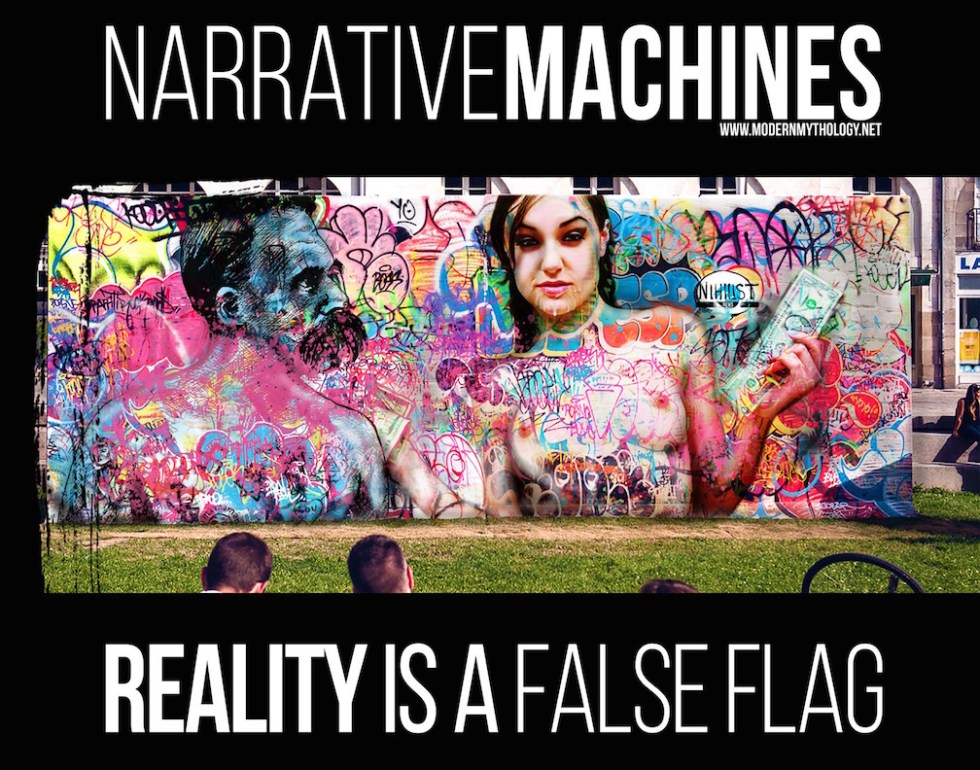
Excerpt from Narrative Machines by James Curio
This Is Not A Game, The Alternate Reality Game Of The Real
“In modern political performances,” writes Richard Sennett in The Culture of New Capitalism, “the marketing of personality further and frequently eschews a narrative of the politican’s history and record in office; it’s too boring. He or she embodies intentions, desires, values, beliefs, tastes — an emphasis which has again the effect of divorcing power from responsibility.”
Consider this in contrast to the scheme presented in “They Live,” where there is one true reality that underlies all the messages that we are bombarded with. Nada puts on the glasses, and those covert messages are rendered overt. OBEY. CONSUME.
Reality, of course, is far more confusing. All messages are “in code”, every collection of data points can be fictionalized in any number of ways. And we must ask to what purpose? All fictions stand in for the truth as they are repetitively performed. This is the central fallacy behind Enlightenment or pop-cultural re-interpretations of the implicit awakening, getting #woke, or taking the Red Pill. There is no one truth hidden beneath propaganda. The rise of conspiracy news should not be mysterious in light of this. One does not “step out of ideology,” one switches one pair of glasses for the next.
We may find no better presentation of the crisis of the hollowness of appearance than Baudrillard’s Simulacra and Simulation — the surface has subsumed the possibility of an essence. The anxiety here is that without some sort of Neo-Platonic ground to rest on, an immoveable point to hang Foucault’s Pendulum from, the whole world will come undone. And people are right to feel anxious, though the fear is ultimately baseless.
…even the Pendulum is a false prophet. You look at it, you think it’s the only fixed point in the cosmos. but if you detach it from the ceiling of the Conservatoire and hang it in a brothel, it works just the same. And there are other pendulums: there’s one in New York, in the UN building, there’s one in the science museum in San Francisco, and God knows how many others. Wherever you put it, Foucault’s Pendulum swings from a motionless point while the earth rotates beneath it. Every point of the universe is a fixed point: all you have to do is hang the Pendulum from it.
All being is ungrounded. That central assertion of existentialism — that existence precedes essence — is not one that we’d like to challenge. Much of Baudrillard’s book seems to react directly with today’s headlines, of the collapse of ‘consensus reality’ (or the sense that there is one), into the event horizon. Consider this rather lengthy passage,
The impossibility of rediscovering an absolute level of the real is of the same order as the impossibility of staging illusion. Illusion is no longer possible, because the real is no longer possible. It is the whole political problem of parody, of hypersimulation or offensive simulation, that is posed here. For example: it would be interesting to see whether the repressive apparatus would not react more violently to a simulated holdup than to a real holdup. Because the latter does nothing but disturb the order of things, the right to property, whereas the former attacks the reality principle itself. Transgression and violence are less serious because they only contest the distribution of the real. Simulation is infinitely more dangerous because it always leaves open to supposition that, above and beyond its object, law and order themselves might be nothing but simulation. But the difficulty is proportional to the danger. How to feign a violation and put it to the test? Simulate a robbery in a large store: how to persuade security that it is a simulated robbery?
There is no “objective” difference: the gestures, the signs are the same as for a real robbery, the signs do not lean to one side or another. To the established order they are always of the order of the real. Organize a fake holdup. Verify that your weapons are harmless, and take the most trustworthy hostage, so that no human life will be in danger (or one lapses into the criminal). Demand a ransom, and make it so that the operation creates as much commotion as possible — in short, remain close to the “truth,” in order to test the reaction of the apparatus to a perfect simulacrum. You won’t be able to do it: the network of artificial signs will become inextricably mixed up with real elements (a policeman will really fire on sight; a client of the bank will faint and die of a heart attack; one will actually pay you the phony ransom), in short, you will immediately find yourself once again, without wishing it, in the real, one of whose functions is precisely to devour any attempt at simulation, to reduce everything to the real — that is, to the established order itself, well before institutions and justice come into play.
Read more “We Can Weaponize Fiction, But How Do We Monetize Truth? Excerpt from Narrative Machines.”

